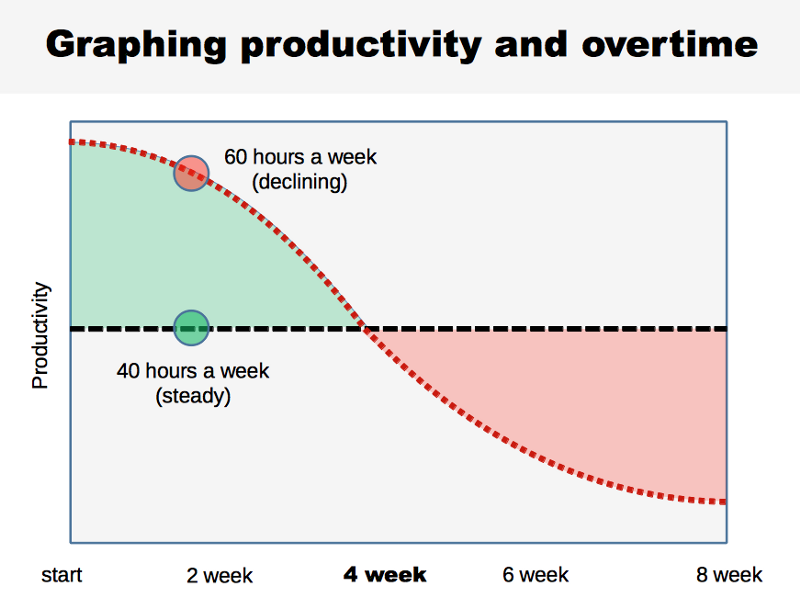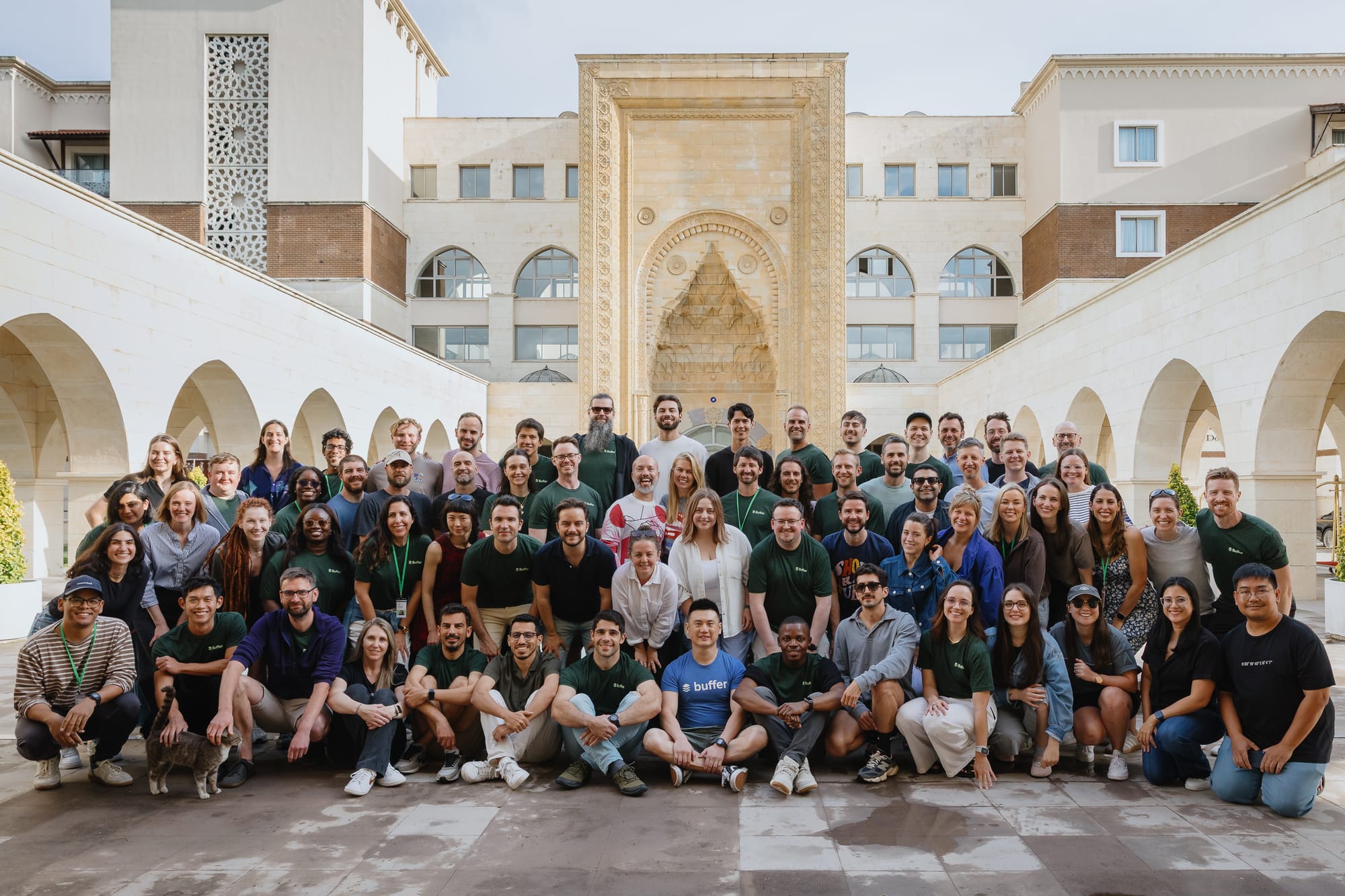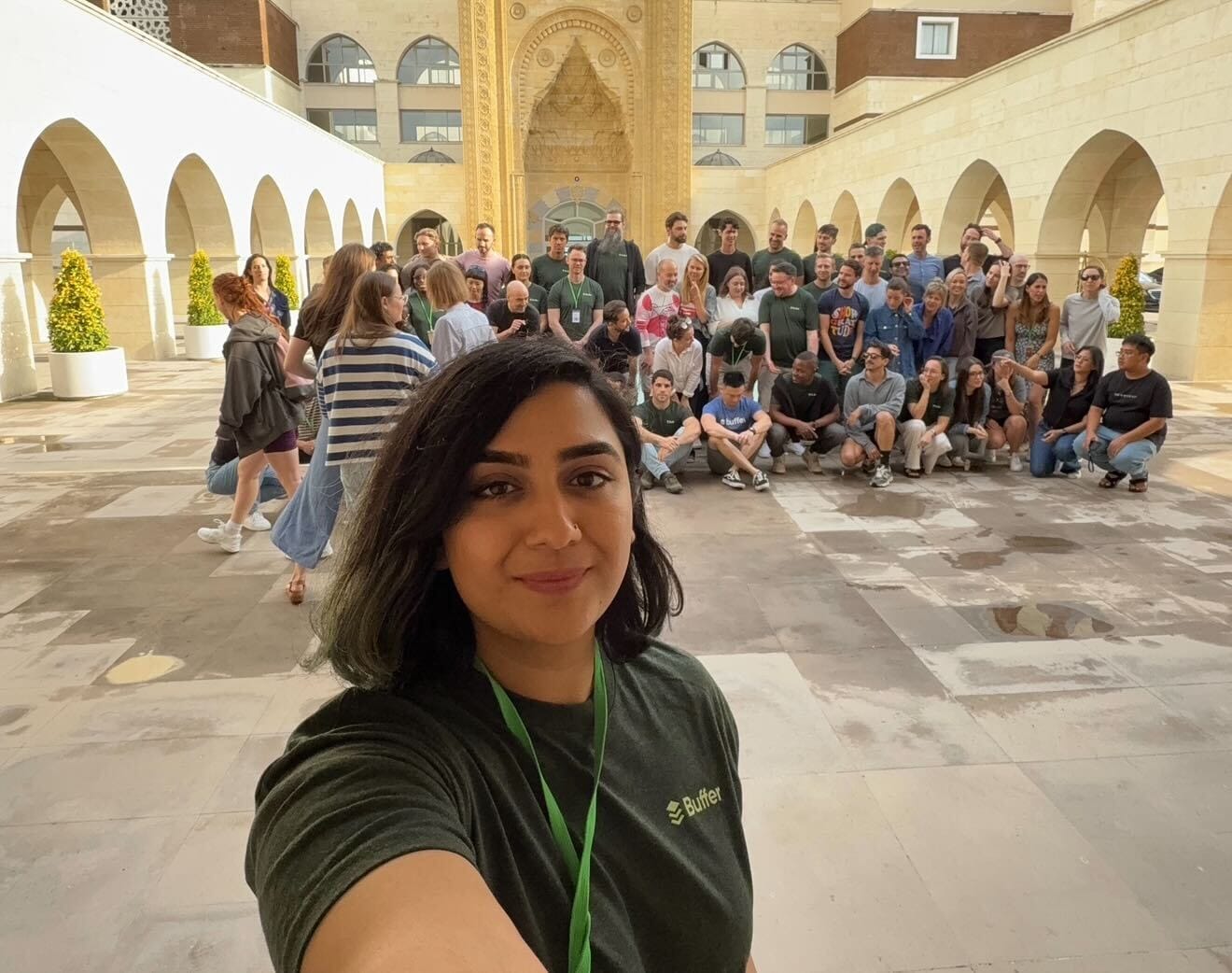A Year At Buffer: Top 10 Things I Learned While Working at a Startup

Product Marketing @ Buffer
On September 14th, I celebrated my first Buffversary — a year at Buffer, a social media management startup. I thought it would be a good opportunity to take some time to reflect on the past year and share some of the things I learnt.
A bit of background: I’m a Community Champion and I have been working on our community initiatives such as our weekly #bufferchat and our Slack community. Recently, after the Marketing and Community team combined forces, I have started working on a few marketing projects too.
I was working part-time for the first nine months while finishing up the final year of my undergraduate degree in the UK. Since I graduated in July, I have started working full-time and moved back to Singapore.
The past year has been quite a wild and incredible journey with mostly ups and a few downs. In this post, I’d love to share the top 10 things I learned in my first year at Buffer.
1. Culture is important
Before I joined Buffer or even heard about Buffer, I had no idea what company culture was. I didn’t know it is related to company values either. Embarrassingly, I once worked at a big company for eight months without knowing what the company values were.
Now, I realize how important culture is. It plays a huge role in almost everything we do, from how we hire to how we build our product to how we market ourselves to how we interact with our customers and one another in the team and more.
As our co-founder and COO, Leo Widrich shared, “Focusing on your company culture and values allows you to build a great company. It allows you to stop operating by policy and start operating by principle.”
It’s not that policies are bad; they are probably necessary for certain things or at a certain stage. I think it’s just when we have shared values that we all agree on, we are able to get onto the same page faster and make decisions faster. When we are facing difficult decisions, we are also able to fall back on our values and let them guide us.
We have a value, “Default to transparency.” It’s usually easy to be transparent when things are going well and much harder when things aren’t. Earlier this year, we had some cash flow issues and had to unfortunately lay off several team members. It wasn’t easy to share such news but I believe we never asked ourselves if we should share the news. We knew we would share it.
2. Things change frequently, usually for the better
To give you a slight sense of it: When I first joined Buffer, we were just transitioning out of self-management and embracing hierarchy and mentoring. Our Product teams structure have changed several times. I took over our Beta Community for a few weeks before passing the baton to Patrik Ward, our Product Research Lead. And recently, the Community and Marketing teams combined forces.
At first glance, having such regular, and sometimes large-scale, changes can be rather scary and possibly disruptive. However, on deeper analysis, I usually find they make a lot of sense and are often required in those circumstances.
Our experiment with self-management taught us that the concept might not quite suit us. As our team grew, we changed the team structure whenever it feels like the previous structure aren’t working well for us anymore. The Product Research team has much more context around our product than I do so it feels better to let them head the Beta Community. The distinction between Marketing and Community has been quite blurry for us all these while. So far, each iteration has felt like an improvement.
As the saying goes, change is the only constant (in a startup). Hence, I learned that it’s important to be flexible and able to adapt quickly to changes.
(Fun fact: At the start of the year, I planned my OKRs for the entire year and quickly learned that it might not last that long!)
3. Challenge the norms
Fully distributed team. Formula-based salaries. Transparent salaries. Transparent fund raising term sheet. Transparent emails.
These are rather unconventional ways of doing things. Hiten Shah, our of our closest advisors, described the things we do as “crazy shit.” We aren’t doing all these just to be different but because we believe they could work and might be better for us.
We chose to be a distributed team so that we could provide even better and timelier customer support. Having formula-based salaries transcends the need to negotiate salary and prevents gender and color discriminations. We make many things transparent because we believe transparent breeds trust and trust is the foundation of great teamwork.
We have also benefited from such less traditional practices. By working remotely, we can be where we are the happiest — traveling the world or being home with our family. When we made our salaries transparent, the number of inbound job applications increased greatly. I think when we were live-blogging the hacking incident, someone’s comment on the blog post helped us solve a puzzle of the hack.
I learned that just because things are usually done in a certain way, it does not mean that’s the only way of doing things. Sometimes, the unconventional ways might be even better.
4. Measure results, not just hours
Talking about challenging the norm, this feels like another one (and one that I’m still struggling with!) It seems quite common to be measuring the number of hours we have worked than the amount of quality work we have produced. Maybe because it’s easier to track time and time is easily understood and could be compared with even across different jobs.
“I worked 15 hours yesterday.” “I worked 80 hours last week.” “I worked till 2 am last night.”
I’m guilty of this!
I feel that I shouldn’t only measure how many hours I’ve worked but also how much quality work and results I’ve produced during that time period. (I do recognize that it can be challenging to measure the amount of quality work, too.)
If you could produce proportionally more quality work by working longer hours, that’s great! (Elon Musk comes to mind, though I believe few people are like him.) I learned that beyond a certain number of hours, my productivity and quality of work fall and might even become negative — when I make mistakes in my work and have to redo the task another time. It might be more useful to spend those extra hours resting or doing something else to recharge myself.
I’m often reminded of this blog post and a graph in it:

Measuring both time and results allows me to know how efficient and effective I am, instead of having a false badge of honor for working crazily long hours.
5. Disconnecting is essential
Two weeks ago, I was burnt out.
But I didn’t really know at that time, because I still felt excited about the things I was working on. However, I did recognize that while I was excited, I had little motivation to work on my projects. I brushed it off, thinking that it might be just be one of “those” weeks and I’d be alright soon.
Then, I was forced to disconnect for four days after an eye surgery. I couldn’t see anything on my laptop or mobile screen and it was imperative that I give my eyes time to recover or risk permanent damage! After the four days, I got back to work, feeling both excited and motivated to jump onto my projects. That was when I realized that I was burnt out the week before.
At Buffer, we encourage team members to take time off through initiatives like unlimited vacation time. Recently, we instituted a new recommendation of minimum time off.
While it’s great to be disconnected from the internet and social media entirely once in a while (and I’m glad I had the opportunity during that four days!), I think just being fully disconnected from work alone occasionally can be very helpful too.
6. Being focused and effective is important as resources is limited
The path we have chosen at Buffer is rather non-Silicon-Valley style. I believe most startups in Silicon Valley at our stage would have raised $30–40 millions of funding while we have raised about $4 million so far. Instead of an “aggressive growth” path, we have chosen to take the “natural growth” path.
This meant that we can’t simply hire more people or spend more to do more. We try to be lean and resourceful about achieving things. So it’s important to focus on the most essential and impactful work.
Just a while back, I asked our designers for help with our Medium publication logo. Upon reflection, I realized that might not be the best use of their time since the logo is probably not that important in the context of things. The content is likely to be much more important than the design or illustrations in the blog posts. If I could come up with a reasonable design, that would have been more effective overall. (That said, Lorenz VS, one of our designers, was super kind to jump onto a sync with me to teach me more about design and helped with the logo design!)
This is a reason why we feel it’s great for us to be generalists or T-shaped people (i.e. having a specialization and also being rather knowledgeable about other areas such as being a content marketer who can also design and code a little.) This way we can take on different roles to tackle the various problems we would face and be more effective overall. For example, when I want to do some basic data analyses, I could do it myself, instead of asking for too much help (like I still do now.)
7. Teamwork makes the dream work
Having said the point above, I believe there are times when we would (and probably should) rely on one another in the team to get things done efficiently — when the level of skill required is rather advanced, for instance. That’s why there are different roles in the team — Happiness Heroes, Data Analysts, Engineers, Life Savers, Culture Scouts and more.
For the Marketing team, we are lucky to have David Gasquez to help us with data analysis we couldn’t quite do previously. Also, Steve Dixon, a Product Designer turned Engineer, joined the Marketing team recently to cast his magic on our landing pages. (I’m guilty of creating several poorly designed landing pages!)
Another of such times is when we need to take days off for vacation or any other reasons. When I took six weeks off for my final exams, my teammates were awesome in covering my work. When they need help, I’ll be sure to offer my support too.
8. Surrounding myself with talented people makes me better
One of the (many) reasons I’m grateful to be working at Buffer is I’m surrounded by incredibly talented and driven people. It would probably take a book to share all the examples but I’ll share a few (I’m probably not doing them justice by mentioning only one of their many achievements and summarizing it into a sentence):
- Nicole M. Miller, our first Community Champion, built our amazing Buffer community.
- Steve Dixon was hired as a Product Designer and now he helps out with some engineering tasks.
- Rodolphe Dutel built a community of more than 20,000 remote workers as a side project.
- Katie Womersley taught herself how to code and is now our first Engineering Manager.
I could go on forever!
I strongly believe in the statement by Jim Rohn, “You are the average of the five people you spend the most time with.” Just by spending time these amazing people, I‘m motivated and inspired to become better at what I do.
I think Scott Dinsmore of Live Your Legend said something along the lines of
When you surround yourself with people doing the “impossible,” the “impossible” becomes possible.
There are so many examples of possibility in the team. If I ever feel that something is impossible, I can likely find someone in the team who has done the “impossible” and know that it can be done.
9. Learning is largely self-driven and flexible
Of course, being motivated and inspired is only half of the equation to becoming better. Putting in the effort to learn and practice is the other half.
I have a friend who just started his graduate job at one of the “Big 4” accounting firms. The first few things he went through were two days of orientation followed by training for his role. Unlike big corporations, we do not have structured training courses (yet). However, we have a huge amount of flexibility to pick what we want to learn and great mentors to guide us (more about this in the next point).
My team lead, Kevan Lee, knows that I want to grow my marketing skills and has been encouraging me to start with content marketing. Now, I’m working on our Medium publication, managing and editing guest posts, helping to promote content and more. Kevan and my fellow Marketing teammates have been really great with helping and teaching me too! On the side, I want to know how to code so I started learning how to code during my free time.
I believe it makes most sense to pick up and hone skills that are requested for the job. Thankfully, at a startup where almost everyone wears multiple hats, almost any skill would be quite beneficial!
10. Regular check-ins are very helpful for personal and professional growth
Every week, I have my 1-on-1 session with my team lead, previously Nicole and now Kevan. Because we believe in bringing our whole self to work, we don’t talk about only work matters (which includes culture related discussions) in our 1-on-1s but often our personal life too. Usually, I find these are the times when I grow the most on a personal and professional level.
Recently, I started a habit of planning the agenda for each of my 1-on-1s. The simple agenda includes the things I want to discuss with Kevan and a brief weekly progress report. The act of planning the agenda itself has been very beneficial as it makes me pause and reflect on the past week and take stock of my progress against my Objectives and Key Results (OKRs).
During my 1-on-1s, Kevan and I would also chat about longer term goals and career progression. I’m very grateful that Kevan (and Nicole too) is very dedicated to nurturing us and making sure we are working on things we are interested in and inline with our longer term goals. I find this really great for career development (even at a time when we don’t really have proper career development paths yet).
Another reason I find 1-on-1s very beneficial is that my managers have created a very safe environment for me to share, I would say, anything. When I face any challenges or difficulties at work or outside work, I feel comfortable sharing these issues with them and getting their advice.
Over to you
And that’s the top 10 things I’ve learnt in the past year. As I wrote this post, I thought of even more things I’ve learnt during the year and I’m very thankful for this opportunity!
Now, onto my second year! ?
Have you worked in a startup before? I’d love to hear and learn about your experiences!
Try Buffer for free
180,000+ creators, small businesses, and marketers use Buffer to grow their audiences every month.
Related Articles

We've been hosting Retreats at Buffer for 12+ years. In this article, we've detailed everything we've learned from 14 Retreats.

I recently attended my first in-person, international conference. Here's what I learned.

What it was like to join a fully remote team like Buffer, and how going on the company retreat so early on helped shape my journey in ways I hadn’t imagined.